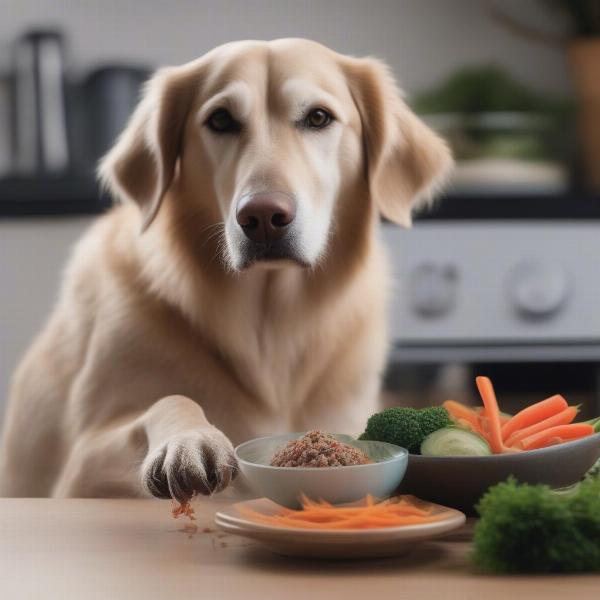Hypothyroidism in dogs can be a tricky condition to manage, and diet plays a crucial role. If your furry friend has been diagnosed with this condition, you’re probably wondering what to feed a dog with hypothyroidism to help them thrive. This article will guide you through choosing the best food for your hypothyroid dog, focusing on nutrient-rich options that support their overall health and manage their specific needs.
Understanding the Dietary Needs of a Hypothyroid Dog
Dogs with hypothyroidism have a slower metabolism due to a deficiency in thyroid hormones. This means they can easily gain weight, even without an increase in food intake. They also often experience skin and coat issues, lethargy, and difficulty regulating body temperature. Therefore, a dog with hypothyroidism requires a diet that supports a healthy weight, provides essential nutrients for skin and coat health, and boosts energy levels.
 What a dog with hypothyroidism eats
What a dog with hypothyroidism eats
Key Nutrients for a Hypothyroid Dog’s Diet
The best dog food for hypothyroidism will prioritize certain key nutrients. High-quality protein is crucial for maintaining muscle mass and supporting a healthy metabolism. Look for foods with easily digestible protein sources like chicken, turkey, fish, or lamb. Fiber is also essential, as it helps regulate digestion and manage weight. Foods rich in omega-3 fatty acids, like fish oil, can contribute to healthy skin and coat and reduce inflammation.
Choosing the Right Type of Dog Food
When choosing what to feed a dog with hypothyroidism, you have several options: commercial dry food, wet food, or a homemade diet. Each has its pros and cons. Commercial diets are convenient, but ensuring they meet your dog’s specific needs is vital. Look for formulations specifically designed for weight management or sensitive stomachs, as these often contain higher protein and fiber content. Wet food can be more palatable for some dogs, but it’s crucial to monitor calorie intake to prevent weight gain. Homemade diets offer the most control over ingredients, but they require careful planning and balancing to ensure they provide all necessary nutrients. Always consult with your veterinarian before starting your dog on a homemade diet.
Foods to Avoid for Hypothyroid Dogs
Certain foods can exacerbate hypothyroidism symptoms and should be avoided. These include highly processed foods, foods with excessive fillers, and those high in soy, as soy can interfere with thyroid medication absorption. Also, limit treats and table scraps, which can contribute to weight gain and disrupt the balance of your dog’s diet.
Monitoring Your Dog’s Progress
Once you’ve implemented a new diet, monitor your dog’s weight, energy levels, and coat condition. Regular check-ups with your veterinarian are essential to track thyroid hormone levels and adjust medication if needed.
Common Questions About Feeding a Hypothyroid Dog
-
Can my dog with hypothyroidism eat raw food? While a raw diet can be beneficial for some dogs, it’s crucial to discuss it with your veterinarian first, as it can pose certain risks if not properly balanced.
-
What if my dog won’t eat their new food? Introducing new food gradually can help. Mix a small amount of the new food with their current food and gradually increase the proportion over several days.
-
Are there any supplements I should consider? Your veterinarian may recommend specific supplements, such as omega-3 fatty acids or probiotics, to support your dog’s overall health.
Conclusion
Choosing the right food is essential for managing hypothyroidism in dogs. A diet rich in protein, fiber, and omega-3 fatty acids, while avoiding processed foods and excessive fillers, can help your dog maintain a healthy weight, improve their coat and skin, and boost their energy levels. Remember to consult with your veterinarian to develop a personalized dietary plan that meets your dog’s specific needs.
FAQs
-
How often should I feed my dog with hypothyroidism? Most adult dogs do well with two meals a day.
-
Can I give my hypothyroid dog treats? Yes, but in moderation. Choose healthy, low-calorie treats.
-
What are the signs that my dog’s hypothyroidism is not well-managed? Weight gain, lethargy, hair loss, and skin infections can be signs of poorly managed hypothyroidism.
-
How long does it take to see improvement in my dog’s condition after changing their diet? It may take several weeks to months to see noticeable improvements.
-
Is it expensive to feed a dog with hypothyroidism? The cost varies depending on the type of food you choose. High-quality commercial or homemade diets may be more expensive than standard dog food.
-
Can hypothyroidism be cured with diet alone? No, diet plays a supporting role, but medication is usually necessary to manage hypothyroidism.
-
What should I do if my dog’s symptoms worsen despite dietary changes? Consult your veterinarian immediately, as medication adjustments or further investigation may be needed.
ILM Dog is a leading online resource for dog owners worldwide, dedicated to providing expert advice on all aspects of dog care, from breed selection to health and nutrition. We offer a wide range of articles, guides, and resources to help you provide the best possible care for your furry friend. Whether you’re a new dog owner or a seasoned expert, ILM Dog has the information you need. Learn more about dog grooming and other topics by exploring our other articles. Contact us at [email protected] or +44 20-3965-8624 for personalized advice.